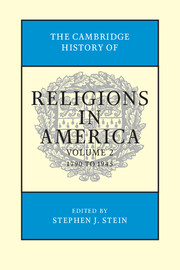Book contents
- Frontmatter
- Contents
- Contributors
- Editor's Introduction
- SECTION I RELIGION IN NORTH AMERICA
- SECTION II RELIGIONS IN THE NEW NATION, 1790–1865
- SECTION III CHANGING RELIGIOUS REALITIES
- 11 Diversity, Revival, Rivalry, and Reform: Protestant Christianity in the United States, 1800–1950
- 12 American Catholics, 1800–1950
- 13 American Judaism, 1820–1945
- 14 Formation and Consolidation of African American Religious Communities, 1865–1945
- 15 Eastern Orthodox Christianity in America
- 16 New Religious Movements
- 17 American Indian Religions in America, 1790–1945
- 18 Why Muslims Matter to American Religious History, 1730–1945
- 19 Asian Religions in the United States: The Role of the 1893 World’s Parliament of Religions in Shaping an Evolving Pluralist Ideology
- 20 Metaphysical Movements
- SECTION IV RELIGIOUS RESPONSES TO MODERN LIFE AND THOUGHT
- SECTION V COMPARATIVE ESSAYS
- SECTION VI RELIGION AND DIVERSE AREAS
- Index
- References
14 - Formation and Consolidation of African American Religious Communities, 1865–1945
from SECTION III - CHANGING RELIGIOUS REALITIES
Published online by Cambridge University Press: 28 July 2012
- Frontmatter
- Contents
- Contributors
- Editor's Introduction
- SECTION I RELIGION IN NORTH AMERICA
- SECTION II RELIGIONS IN THE NEW NATION, 1790–1865
- SECTION III CHANGING RELIGIOUS REALITIES
- 11 Diversity, Revival, Rivalry, and Reform: Protestant Christianity in the United States, 1800–1950
- 12 American Catholics, 1800–1950
- 13 American Judaism, 1820–1945
- 14 Formation and Consolidation of African American Religious Communities, 1865–1945
- 15 Eastern Orthodox Christianity in America
- 16 New Religious Movements
- 17 American Indian Religions in America, 1790–1945
- 18 Why Muslims Matter to American Religious History, 1730–1945
- 19 Asian Religions in the United States: The Role of the 1893 World’s Parliament of Religions in Shaping an Evolving Pluralist Ideology
- 20 Metaphysical Movements
- SECTION IV RELIGIOUS RESPONSES TO MODERN LIFE AND THOUGHT
- SECTION V COMPARATIVE ESSAYS
- SECTION VI RELIGION AND DIVERSE AREAS
- Index
- References
Summary
The persistence of racial inequality and cultural derision toward black religion within white denominations, whether based in the North or South, convinced African Americans to maintain and establish their own separate and autonomous religious communities. Whether these entities existed outside of white religious structures or within white majority organizations, African Americans declared their right to govern their own institutional affairs and to define the content of black belief, ritual, and practice. Though these activities mainly occurred in innumerable Afro-Christian communities, significant segments of the black population developed faith identities through Judaism, Islam, and African religious retentions. Within these black religious bodies, gender, class, and culture played major roles in shaping their institutional identities. Moreover, there was vigorous discourse among religious leaders and grassroots constituencies about their relationship to Africa, initiatives for overcoming racial barriers, and whether belief and practice should emphasize interracial interactions and black nationalist objectives. Major developments in the American and African American experience between 1865 and 1945 – namely, legalized segregation, urbanization, industrialization, migration, depression, two world wars, and the flowering of the arts and music – were reflected and debated in black religious communities. Hence, African religious history became a microcosm of the black experience and an arena in which broad currents in American history were confronted and challenged.
- Type
- Chapter
- Information
- The Cambridge History of Religions in America , pp. 300 - 323Publisher: Cambridge University PressPrint publication year: 2000



